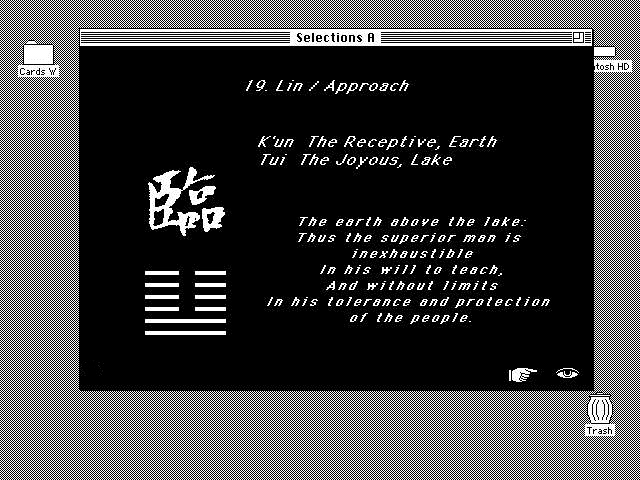I Ching
The fourth ('geometric') row of buttons brings up the 64 I Ching hexagrams, with the core saying. The I Ching is one of the Chinese Confucian 'five classics', and you can see touches of Confucianism in the laying out of what the 'Superior Man' should do to continue being an example to the people. The 64 hexagrams come up as you select the 4 buttons to the right - and the spaces in the patterns allow the 64 choices to fill in the 100 available buttons.
I have laid out here how the hexagram patterns lead to having 64 combinations. Here the pattern is laid out to follow a binary counting sequence, from 1 to 2, 1 to 4, 1 to 8 ... So 64 covers a hexagram's worth of permutations, following the 2**6 combination prediction.
The I Ching count follows a different pattern - 1. is the inverse image of 2., and that pattern mostly follows - with some pairings of top/bottom mirror patterns. Roger filled in the buttons in a pretty rigorous order, looks like he was just finding a pleasing pattern, no messages hidden in it (?).
The I Ching was conceived as an 'oracle', where the user would do something random to pick a number, and use that to look up the selected hexagram to interpret your predicted future. The Whirlitzer gives you a way to conveniently randomly select your hexagram, without throwing yarrow sticks or burning tortoise shells.
The I Ching has influenced the West - the I Ching edition Roger refers to has a forward by Carl Jung. I always remember the I Ching reference in the Firesign Theatre's How Can You Be In Two Places At Once, When You're Not Anywhere At All, where Nick Danger quotes from 7., "The Army" (a part of the text not reproduced in the section put in the WoW) the part about "vests families with fiefs" about 10:30 in the clip:
That sounds awfully highbrow! - an antidote would be to listen to "Babes in Khaki", same album:
https://www.youtube.com/watch?v=rJqJp8bq7aU
The first button is reserved for sayings from Tao Te Ching, by Lao Tzu. Roger has taken 25 sayings from the book. He went in order, taking the verses that meant most to him, chapter by chapter (skipping a few). The Taoist philosophy seems so diametrically opposed to the Confucian one, even though both are authentically Chinese. Lao Tzu always infuriates me, his advice against effort and choice so different from what the 'Superior Man' would think and do.
The Wikipedia entry for Lao Tzu is colorless and vague - unlike my favorite description of him in Ernst Gombrich's A Little History of the World, where Lao Tzu is emphatically indifferent and forcefully detached.





Comments
Post a Comment